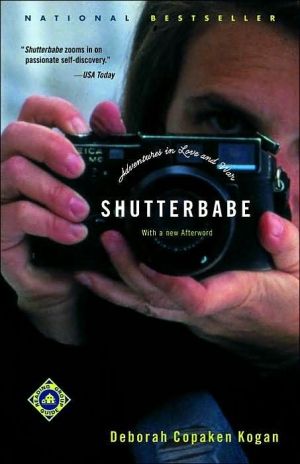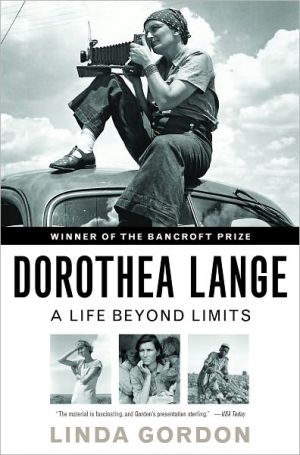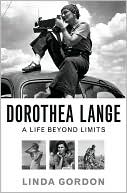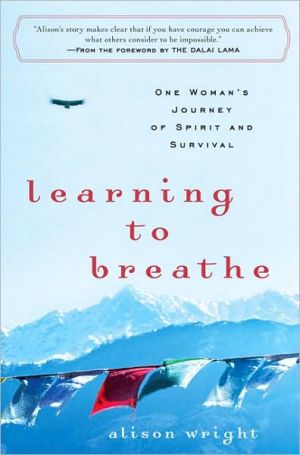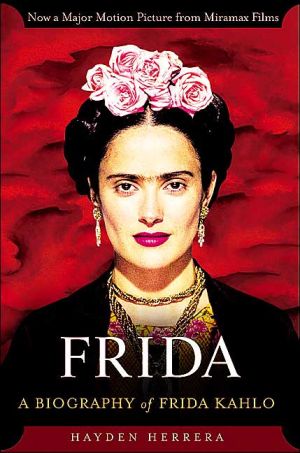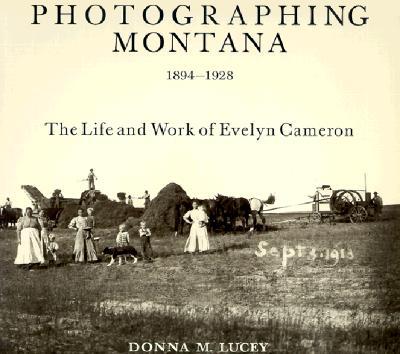Shutterbabe: Adventures in Love and War
Fresh out of college and passionate about photography, Deborah Copaken Kogan moved to Paris in 1988 and began knocking on photo agency doors, begging to be given a photojournalism assignment. Within weeks she was on the back of a truck in Afghanistan, the only woman—and the only journalist—in a convoy of mujahideen, the rebel “freedom fighters” at the time. She had traveled there with a handsome but dangerously unpredictable Frenchman, and the interwoven stories of their relationship and the...
Search in google:
What if the protagonist in that age-old tale boy goes to war, comes back a man were a female? Shutterbabe, Deborah Copaken Kogan's remarkable debut, is just that: the story of a twenty-two-year-old girl from Potomac, Maryland, who goes off to photograph wars and comes back, four years and one too many adventures later, a woman.Washington Post - Liza Featherstone...eloquent and well-observed, not only about the memoirist but about the world: war, death, photojournalism and, of course, the worldwide battle between the sexes.
Chapter 1\ Pascal THERE'S A WAR GOING ON, AND I'M BLEEDING.\ \ An unfortunate situation, to be sure, but considering it's 2 a.m., fresh snow is falling and I'm squished in the back of an old army truck with a band of Afghani freedom fighters who, to avoid being bombed by the Soviet planes circling above, have decided to drive without headlights through the Hindu Kush Mountains over unpaved icy roads laced with land mines, it's also one without obvious remedy. I mean, what am I supposed to do? Ask the driver to pull over for a sec so I can squat behind the nearest snowbank to change my tampon?\ I don't think so.\ It's February 1989. I am twenty-two years old. My toes are so cold, they're not so much mine anymore as they are tiny miscreants inside my hiking boots, refusing to obey orders. In my lap, hopping atop my thighs as the truck lurches, as my body shivers, sits a sturdy canvas Domke bag filled with Nikons and Kodachrome film, which I'm hoping to use to photograph the pullout of the Soviet troops from Afghanistan.\ Actually, I have no idea how to photograph a Soviet pullout. Though this is my second story as a professional photojournalist, I'm still not clear on what it is photojournalists actually do in a real war.\ The first story I covered, the intifadah, was more straightfor-\ ward. Organized, even. I'd take the bus early every morning from my youth hostel in Jerusalem to the nearby American Colony Hotel, where all the other journalists were staying (and where I eventually wound up staying when my clothes were stolen from the youth hostel), and I'd go straight to the restaurant off the lobby. There, I'd ingratiate myself with any photographer I could find who had information about the day's planned demos, his own rental car, and a basket of leftover Danish.\ After eating, we'd drive around the West Bank and wait for the Palestinian kids to throw rocks at Israeli soldiers, which we knew they would do only once a critical mass of journalists had assembled. Then we'd record the resulting skirmishes onto rolls of color slide film while trying to evade arrest and/or seizure of our exposed films by the soldiers. Next, we'd all rush back to Jerusalem to the Beit Agron, the Israeli press office, where we would lie about what we'd just shot ("religious Jews," we'd say, or "landscapes,") and get our government-issued shipping forms stamped and signed accordingly. Finally, we'd head to the strange little cargo office at the airport in Tel Aviv to send our film on a plane back to our photo agencies in Paris. Simple.\ But here in Afghanistan the situation is more obscure. I'm alone, for one, which among other things means I have no one to help me figure out basic puzzles like how to get my exposed film out of the mountains. Or how to write captions when no one around me speaks English, and I have no idea where, exactly, these photos are being taken or what it is I'm actually seeing. I'm just assuming that at some point, someplace, I will see some dead or bloody mujahed, or some dead or bloody Russian soldier, or some mujahed firing off his Kalashnikovs, or one of those great big Soviet tanks whose names I can never remember, or, well, something that looks vaguely warlike that I can shoot and send-again, it's murky to me exactly how-back to my photo agency in Paris.\ I look over at Hashim, who's rearranging blankets, knapsacks and boxes of ammunition to clear more leg room on the crowded truck bed. He yanks my maroon nylon backpack from the center of the pile, fills in the newly empty space with a green metal box, mimes "Can I sit on this?" while pointing at my backpack, and, when I nod yes, he wedges it into a corner and plops his 180-pound rump right on top of it. A gentle crunching sound ensues, followed almost immediately by the smell of rubbing alcohol. Shit. My mind races to try to recall what else, besides the bottle of alcohol, I packed in that outside zippered pocket.\ Then I remember. My box of Tampax. My one and only box of Tampax.\ Well, now. I'm fucked.\ Oblivious, Hashim slowly inhales a Winston cigarette and kneads his amber worry beads through his ragged fingers. Trained as a journalist, he's the one Afghani among my forty-seven escorts who actually speaks a few key English phrases such as "Food soon," "Danger, stay in cave," and "Toilet time, Miss Deborah?" But even though I know he will probably understand me if I say, "Please get off my bag," he definitely won't understand "because my tampons are exploding." And because "Please get off my bag" sounds sort of rude, and because the squishy backpack does look like a comfy place to sit while all of us are scrunched together on the back of this rickety old truck heading God knows where, and because my hygiene woes do not hold a candle to the miseries of jihad, I say nothing. Besides, I'm covered from head to toe in an electric-blue burka-an Islamic veil, worn like a Halloween ghost costume-which tends to hinder communication. Not only does it muffle my speech, it makes it impossible to guess, for example, that underneath all this rayon, under my shiny blue ghost costume, I cannot stop crying.\ What on earth possessed me to come here?\ In a word, Pascal. It's Pascal's fault I'm here all alone, and when I get back to Pakistan I'm going to kill him.\ THE FIRST TIME I noticed Pascal it was from afar, at a café on the rue Lauriston near the Sygma photo agency. That would have been in late September 1988, about two weeks after I'd arrived in Paris, ready to start my life. Every day, I'd go to that same café and spy on the photojournalists eating lunch there. Most afternoons, I'd order a croque monsieur and place my\ portfolio ever so casually on the chair in front of me, hoping that the sight of my work along with the Leica around my neck would somehow draw a photographer over to my table. In my fantasy, the photographer would ask to take a look at the pictures and then, duly impressed, he'd invite me to come join the rest of his gang at his table for an île flottante and a round of espressos. I'd sit down and, after modestly refusing to do so, I'd be persuaded by the other men-they were all men-to pass my portfolio around the group, one of whom would be an important photo editor who'd want to send me that very same afternoon to go cover a war. It didn't really matter which war because I knew better than to be picky. Any war would do.\ But that was just the fantasy. In reality, I had to settle for eating my sandwiches alone and in silence.\ On that first day I noticed Pascal, he strode like a bulldozer into the café, pushing in the cool autumn air from the outside with his angular torso. With what seemed like a single fluid motion, he unhitched the camera bag from his shoulder, placed it in the pile of sacks already there on the banquette, greeted his colleagues with an ironic "Salut, les potes!," pulled off his blue cashmere crew neck, knotted it around his shoulders, lit a cigarette and sat down to fondle a menu. His features were sharp and finely chiseled, his eyes sparkled with what appeared to be a touch of mild insanity, and his lips had corners that turned up when he smiled, like the Joker's in Batman. When his steak au poivre arrived, he sliced into it with the grace of an aristocrat, the tines of his fork facing down then up as one by one the freshly cut morsels disappeared into his mouth, each effortless bite punctuating the rhythm of his fraternal chatter. He is magnificent, I thought.\ Pascal was an up-and-coming war photographer, and I admired his work. His pictures didn't just show action, they screamed action. Bombs exploding, young children crying, soldiers cowering, grimacing, dying. Exactly the kind of images that I was desperate to start shooting, if only I could figure out how.\ After two weeks of getting nowhere with my portfolio-on-the-chair ploy and spending far too many francs on croque monsieurs, I realized I'd been going about it all wrong. With my shaky French, I called the general number for Sygma and asked to speak to Claude, the editor in charge of news photos. For whatever reason, perhaps because he couldn't understand me on the telephone, perhaps because it was a slow news day, he agreed to a meeting. The next afternoon, when I arrived at his desk, he started to laugh. "You're the little girl from the café," he said. A few of the photographers I'd been stalking, Pascal included, stared and tittered from behind the glass wall of the photographers' room.\ As Claude flipped through my portfolio, which was bulging with photographs of strip clubs and the men who visit them, his eyes opened wider and he began to shake his head. Then he muttered "Putain!" I knew putain meant "whore," but at the time I did not know it could also be used idiomatically to mean something more tame, like "wow" or "holy cow." But before I could figure out where the epithet had been directed, at the strippers or at me, Claude looked up and said, "Tu voudrais aller où?"-\ "Where would you like to go?"\ I cocked my head. I crossed my arms. "Israel," I said, more of a dare than a word.\ Claude smiled and, to my amazement, replied, "Fine." We made a deal: I'd pay for the trip; Sygma would pay for my film and development costs and then distribute the pictures upon my return. A break. At last.\ As I turned to leave, Pascal caught my eye and winked. Whenever I thought about that wink afterwards, I'd shiver.\ The next time I saw Pascal, it was two months later. I'd just arrived back from Jerusalem. Chip, my colleague and occasional lover, an American who'd lived in Paris for most of his adult life, invited me as his date to a dinner party Pascal was throwing with his live-in girlfriend in Paris. The live-in girlfriend part should have tipped me off, but then Pascal cornered me in the living room and challenged me, with his mischievous smirk, to a staring contest. No problem, I thought. I'll beat him hands down. But after what must have been less than sixty seconds of locking eyes with the man, I didn't just lose. I was hypnotized, rendered incapable of higher thought. Or even medium thought, like "Stay away. Girlfriend shares his bed."\ Within minutes of losing the staring contest, and battling an overwhelming urge to sniff Pascal's neck, I cooked up a plan. It was a simple plan, really. One that would solve what I was beginning to understand would be a constant dilemma: companionship on the road. With our cameras in hand, we'd leave Paris, our worldly possessions, the live-in girlfriend, and my less sexy lovers behind. We'd spend the next couple of years traversing the planet, bouncing from coup to insurrection, war to revolution, passing our days shooting pictures and our nights under the stars, making love to the gentle thrum of incoming mortar fire.\ Afterwards . . . well, I wasn't exactly sure. I didn't think in afterwards.\ Okay, so I had an active fantasy life, but this time I could smell the thoughts as they popped into my head. Or maybe it was just the big slabs of steak that Élodie, the live-in girlfriend, was preparing in the kitchen. In any case, while Elodie was off in the kitchen preparing the meat, while Chip was embroiled in another conversation, Pascal suddenly turned to me, blew a puff of his cigarette into my face, and said, "I'm going to Afghanistan next week. Why don't you come with me?"\ I sucked on my own cigarette, choked on it really, and blew the smoke back into his face. Then, composing myself, I shot him a conspiratorial smile. "Sure," I said. "Let's do it."\ It was as simple, and as complicated, as that.
\ From Barnes & NobleThe Barnes & Noble Review\ Shutterbabe: Adventures in Love and War is a fascinating coming-of-age memoir about former photojournalist Deborah Copaken Kogan's extraordinary experiences in some of the most dangerous, war-torn regions of the world. Born in the late '60s, Kogan grew up in the post-feminist era, firmly believing that she could pursue any career she wanted to. When she discovered the power and the thrill of photography as a high-spirited, intelligent undergrad at Harvard, she knew that she had found her calling; photojournalism promised the right balance of adrenaline-filled adventure and, idealistic though it may be, humanitarian effort. So, shortly after graduation, she set out in search of a war -- any war -- to expose the evils of the world, and soon she found herself on a bus with a group of Afghani freedom fighters during the pullout of Soviet troops from Afghanistan in 1989. \ And that is where Kogan's story begins. By book's end, she has documented a heroin epidemic in Switzerland, a racially charged conflict over rhino preservation in Zimbabwe, a distressingly inadequate orphanage in Romania, and -- the experience Kogan now remembers as the most frightening of all -- the violent demonstrations in Moscow during the fall of the Soviet Union. As she watches these events through the viewfinder of her camera, she witnesses a multitude of atrocities that profoundly affect both her inner character and her view of the world. Her descriptions of these experiences are full of compassion, youthful naïvité, and horrified disbelief.\ But, despite the unorthodox nature of her job, there is an aspect of Kogan's professional life to which many working women will relate. At 5'-2", she is a far cry from the typical cowboy photojournalist, and professionally, she suffers a fair amount of harassment. Both in the offices of her photo agency and out in the field, many of Kogan's colleagues view her with suspicion. But as her story progresses through countries and conflicts, Kogan successfully surmounts these sexist obstacles, eventually earning the respect of her fellow photographers and proving that women can make outstanding photojournalists. Along the way, she matures as a person, and her stories become both increasingly poignant and enthralling.\ And that's only half the story, for among the Swiss drug addicts and Romanian orphans Kogan also searches for a very different element of human nature: love. Each chapter of Shutterbabe covers not only a specific photo assignment but also a different man in her life, and her romantic escapades are just as exciting and potentially dangerous as the violent warfare she captures on film. From mean-spirited Pascal, who beats her with a telephone, to sweet but sad Doru, who carries Romania's burdens on his shoulders, Kogan's love life is turbulent and sexy, adding to the adventure. When she finally meets her future husband, her descriptions of their time together are touching, tender, and all the more meaningful after the slew of unsuitable Romeos who came before him.\ By the final chapter, after a number of difficult decisions about the relative importance of career versus family (another dilemma that is sure to draw empathy from many working women), Kogan has demonstrated that, although the turf may be different, the search for love is often filled with as many minefields as war. Ultimately, her experiences in both types of battle make Kogan an inspirational role model for women and make Shutterbabe a thoroughly riveting read. (Stephanie Bowe)\ \ \ \ \ \ Liza Featherstone...eloquent and well-observed, not only about the memoirist but about the world: war, death, photojournalism and, of course, the worldwide battle between the sexes.\ — Washington Post\ \ \ From The CriticsKogan loves men. She loves having sex with men, or, as she puts it in her tell-all book, she really, really loves "bedding" men. She'll do almost anything not to be alone or bored. She'll even pick up a camera if it means entree to cheap thrills, if it gives her license to enter worlds unlike the sleepy suburban one where she grew up. Frank, unapologetic and decidedly unpoetic, Kogan's memoir covers her years as a photojournalist, in seedy strip-tease joints, among drug addicts, in war-torn Afghanistan, in Bucharest, in a dizzying succession of beds. Each chapter but the last is titled for each era's most memorable lover, and Kogan's photojournalism itself seems entirely secondary, almost accidental, sprung not so much from passion or politics or even righteous artistic impulse as from a desire for titillation. "My true impetus for wanting to cover wars was, at its core, selfish," Kogan writes. "War was exciting, and I despised being bored." Readers looking for lyrical meditations or thoughtful reflections on the relationship between photography and event, media and message, art and truth won't find them here. What is here instead is the chatty, fast-paced, self-involved story of one woman's first thirty years—how she went from loving men in general to loving one man in particular, how she went from the "run-off-and-see-the-world adventure thing" to the desire to make babies with the very good man she finally marries. \ —Beth Kephart \ \ \ \ \ \ \ Publishers WeeklyTo pursue her dream to cover wars as a photojournalist, Kogan moved to Paris upon graduation from Harvard in 1988. Pretty and petite, with a sharp eye for good-looking, virile colleagues who, incidentally, could help her career, she embarked on a series of adventures that she breezily chronicles with a somewhat disingenuous na vet . Although her publisher compares her to Christiane Amanpour, readers may find more similarities with Candace Bushnell in these episodic vignettes describing both her far-flung assignments and intimate relationships with colleagues. She traveled with Pascal to Afghanistan and Pierre to Amsterdam; Julian helped her in Zimbabwe, but forbade further intimacies; Doru was with her in Romania. When she met Paul, her husband-to-be, Kogan's commitment to photojournalism waned: she blames her distaste on the wartime horrors she witnessed. Calling photojournalists vultures who feed on other people's misery, she conflates paparazzi with photojournalists, expressing disgust at their role in Princess Diana's fatal accident. Upon her return with Paul to the U.S., she began a new career as assistant producer for NBC's Dateline, which she eventually left to become a full-time mother. Kogan's swiftly paced story easily holds the reader's interest as she moves from her carefree days as an aspiring photojournalist to the responsibilities and dilemmas facing a working mother. Copyright 2000 Cahners Business Information.\ \ \ \ \ Library JournalKogan graduated from college in 1988 and moved to Paris to find work as a photojournalist. Shutterbabe is an insightful account of what happened next. Divided into three sections, "Develop," "Stop," and "Fix," which are further divided into chapters--each named after a significant male in Kogan's life--the book centers around the author's adventurous travels, which offer a fascinating glimpse into the danger and excitement of observing wars and riots and the competition to take commercially appealing photographs. Kogan clearly describes the economic realities of photojournalism, the difficulty she had remaining removed from the tragedies she witnesses, how she adapted to a predominantly male profession, and the influence the presence of photographers can have on their subject. Her travels from Afghanistan to Romania reveal a life of excitement, danger, and self-awareness that is hard to put down. Recommended for all libraries. [Previewed in Prepub Alert, LJ 6/1/00.]--Alison Hopkins, Queens Borough P.L., Jamaica, NY Copyright 2000 Cahners Business Information.\ \
